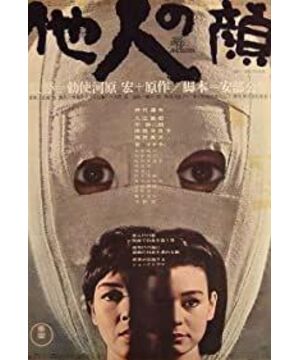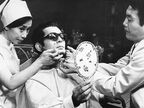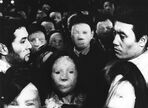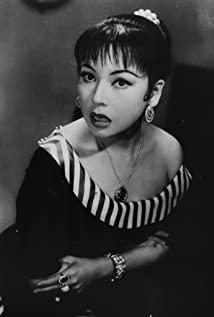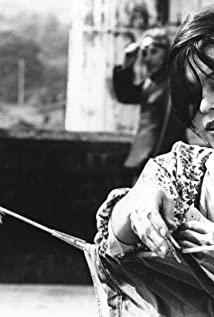Okuyama is thorough, the face is the door to the soul, and rejecting a face is actually a rejection of the soul behind the face. No one accepts a terrifying face as easily as a handsome face, and those outward acceptances are moral rather than genuine.
"Would you like to help me do an experiment?" Okuyama kept asking for proof that he would definitely be rejected. The wife said that it was not others who rejected you, but you closed the door on your own. So he pleaded with his wife in the dark, but he was rejected. He smiled, he was right, and his wife's words were just high-sounding. Although his wife wanted to compensate him a few days later, he knew that a person's instinctive reaction was the real reaction in his heart, and this compensation was nothing but comfort and sympathy, not acceptance in his heart.
The company secretary recognized Okuyama, but Okuyama himself refused this recognition, because how can you recognize the face under the bandage? This recognition is not the recognition of the soul, but the recognition of the social label on himself. In the office, although the chairman kept saying don't care, everything is the same as before, but when Okuyama said that he would not show up again in the future, and only came to work by letters and phone calls, the chairman immediately agreed and said that you would get used to it soon. of. Okuyama once again confirmed that everything was just high-sounding rhetoric. In fact, the chairman "was exhausted after spending a few minutes with me" and would not really accept himself after his disfigurement.
After Okuyama says that "some monsters want to look like people and vice versa", the film introduces another flat story. Okuyama wanted to use the mask to gain re-acceptance and recognition from the society. In contrast, that girl always dreamed that her real self could be accepted by the society.
It can be inferred from the movie that the girl and her brother are a pair of war orphans who grew up on the seaside of Nagasaki. The war took away their family and burned half of her face. She has been bullied and ridiculed since she was a child, and she never got the After equal acceptance, only the brother who lives with each other really cares about her and loves her. How she longed to be loved and accepted, but the young guys were scared away as long as they saw that half of her face. In order not to be laughed at, she would rather move to a mental hospital, but the people there just wanted to occupy her.
She has been looking forward to war, because with war, there will be many homeless or physically injured people like her, so that she can be equally accepted by others. She wanted to see the sea, and her brother accompanied her to see the sea. She was very happy that day, as if even outsiders were getting better to her, she said excitedly "they call me miss". She has never felt so much respect and love like this day, so she can't wait for the war, she said "I'm sure there will be a war tomorrow", she wants to feel loved by a man now, Want to feel the feeling of being equally accepted.
Early the next morning, she tied up the hair that had been used to cover her hurt face, and walked calmly into the depths of the sea, not because of sadness but because of satisfaction, because the true self felt loved and accepted. Be true to yourself and be accepted.
"Put away your sympathy," Okuyama said. He wanted revenge, so he created a handsome new face. In fact, this is not revenge, but verification. He knows that he will be rejected and abandoned by society from now on. He knows that the friendly acceptance of the world is only his status as a social elite and their moral requirements to avoid self-blame. He knows that he is buried alive. , but he was not reconciled, and he had to use the method of proof by contradiction.
He firmly believes that the face is the door to the soul, and rejecting a face is a rejection of the soul behind the face, but he doesn't want to believe that reality is so cruel, how he hopes that there will be accidents. Subconsciously, he hopes that his thoughts are all wrong, so he will try again and again unwillingly. He used a new face to seduce his wife, but it turned out that everything was so simple and smooth, which once again proved that he was right, he couldn't bear it anymore, he wanted to tear off the mask and accuse his wife of all this. But the wife is innocent, and Okuyama's mistake is that he should not use his wife to do this experiment.
The wife is the husband's other half, who's right hand will despise his left hand? To be able to become husband and wife, both parties must have completed the complete acceptance of each other inside and out. In Okuyama's first experiment, he was rejected when he asked his wife for pleasure in the dark. Okuyama thought that his wife was rejecting him. In fact, his wife was just frightened and felt unaccustomed to it, not a rejection of Okuyama. The first misunderstanding occurred due to the different way of thinking.
"I always remember where the mole on your palm is." Even if he changed his face, his wife could easily see through Okuyama. A second misunderstanding occurred here. Okuyama wanted to prove his wife's prejudice against appearance, but his wife thought that Okuyama was trying to save love, so he painted a few layers of makeup to match his participation in the "Masquerade Ball". The wife said: "In love, we all try to unmask each other, so I think it's time to try to put on a mask" to recreate the sense of distance and beauty, to revive the feeling of love.
After understanding his wife's sincerity, he knew that he had misunderstood his wife, but nothing could go back. The wife said it was you who gave up, you can't pretend a mask is real. What is "can't pretend a mask is real"? That is, the mask is just a face. You can pretend that the face is not you, but you can't pretend that you are not yourself. You can temporarily give up your face, but you can't give up all your social relationships and self-awareness forever.
Okuyama, who was locked away by his wife outside the house, became homeless. He wanted to find a home for this face, so he stopped a woman to molest a woman so that he could be locked up by the police, but was rescued by the doctor, so He shouted "I'm a dangerous criminal, you can't let me go".
The face is the door to the soul. Originally, it was to prove that the soul is still oneself without the face. Others cannot reject a heart because they reject a face. As a result, Okuyama, who put on a mask, completely lost himself in the process of verifying. When putting on the mask for the first time, Okuyama said: "It felt strange, like someone controlled me", yes, he was controlled by the mask, he was free, he put on the new mask of the face, but Abandoning the old masks that belonged only to himself, he cut himself off from society, he became something that was neither himself nor anyone else, he became a monster.
At the end of the film, a group of people wearing masks came towards them. The doctor said, "Some masks are taken off, some are not." In the surging crowd, which one is not wearing a mask? A mask is an image, a label, an ethical relationship, and a social norm. If you don't wear a mask, are you still an individual? Masks and make-up are the same, as Okuyama's wife said: "It is noble to hide your face, and a woman cannot show her face without makeup." Make-up makes women humble, and masks allow people to get along with others. It's just that masks are fake, everyone knows it, women don't hide the fact that they use cosmetics, and you can't take fake masks as real.
I think that's the director's answer.
View more about The Face of Another reviews


